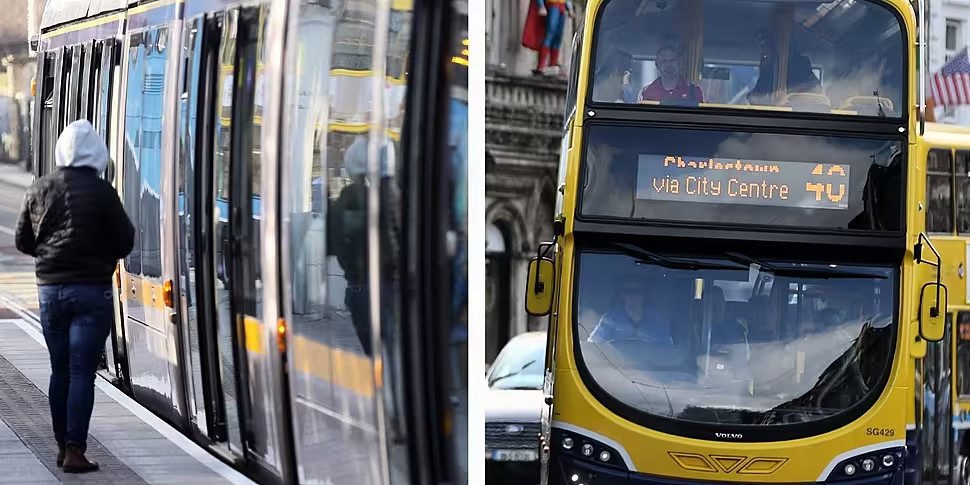Proposals to bring in free public transport could be cheaper than fines Ireland gets for breaking its carbon targets.
That is according to Brian Caulfield, associate professor in the School of Engineering at Trinity College Dublin.
He was speaking as free public transport, reviewing large road projects and pushing cars out of city centres are all among the recommendations of an Oireachtas committee report on the transport sector.
The Joint Committee on the Environment and Climate Action has been looking at how Ireland can reduce transport emissions by 51% by the end of the decade.
Transport accounts for one-fifth of Ireland's total greenhouse gas emissions, and massive changes will be needed to halve that by 2030.
The joint committee report recommends some radical changes.
It recommends a policy to take road space away from cars in cities and towns, with more space for sustainable transport.
It also says plans for large road projects need to be reviewed and potentially replaced with public transport projects instead.
Prof Caulfield told Newstalk Breakfast in context, the changes are not that extreme.
"It does seem very radical, the move they they're looking to make - but if you put it in context: we've eight and a half years to reduce our emissions in transport by 51%.
"Last year, during the pandemic, they only fell by 17% when we were all working from home."
Prof Caulfield said the idea of curtailing road building needs to be watched carefully.
"I do think we need to update and keep the stock safe, and that people can safely travel on our roads.
"But new roads - you'd have to question... why would we add to the problem in terms of carbon from transport".
On the idea of free public transport, he said costing it would be "huge".
"All of the public transport operators that operate in Ireland bring in an awful lot of money, so the costings would be huge.
"I think we need to re-examine how we provide bus in our cities; Belfast have a fantastic example in the Glider up there, that looks like a Luas and is very cost-effective to run.
"But the bigger question is what's the cost of not doing it? How much will the State be panelized if we miss our carbon targets - and the bigger, bigger question around climate change".
Prof Caulfield added that a push towards electric cars may not be the solution.
"You'd have to question whether or not it's a wise use of Government money to encourage people to buy cars.
"While climate is the big issue at the moment, congestion is still also a huge issue.
"And I would question whether or not we should be giving those huge incentives for people that are buying bigger and bigger electric cars that are causing congestion.
"And then there's also the safety issue around cyclists too".
Investment in public transport
The report recommends clear targets for the reduction of road users, and suggests road user charges could be used to achieve this like a congestion charge.
The report said there is significant scope for people to share a fleet of cars, bikes or e-scooters - rather than owning them outright.
It calls for significant investment in public transport to give people options, and asks the Government to cost making public transport free.
Immediate and significant levels of public transport should be created in rural Ireland - while cycling superhighways are suggested for those living outside major cities.
The report calls for further incentives for bikes, e-bikes with a review of the grants for buying electric vehicles.
It suggests introducing secure, sheltered, overnight bike storage at every bus and rail station in the country.
On the commercial side, it said the Government should consider a mandate for zero-emission trucks and move to zero-emission vehicles for all home delivery services.
Dublin Bus 'zero-emissions by 2050'
It comes as Dublin Bus has said is is on-course to become a zero-emissions operator by 2050.
It said recent initiatives have reduced its fleet emissions by 13,500 tonnes and saved 2.5 million litres of fuel a year.
The company said it is committed to delivering a high quality, frequent and zero-emission bus service which is "fully integrated with a suite of flexible transport solutions.
"This can make a significant contribution towards making Dublin one of Europe’s most sustainable cities and one of the best to live in and to visit", it said.
As part of this Dublin Bus said that by 2027, it expects to introduce an additional 330 buses to respond to the anticipated rise in service demand and the delivery of BusConnects.
It is also exploring how it can supplement core bus services with other sustainable modes of transport - and has made a submission to the Department of Transport offering to pilot a public, shared e-scooter scheme.
Additional reporting: Sean Defoe









